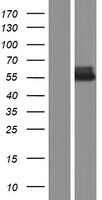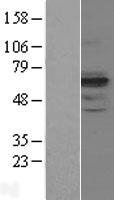order histories, retained contact details for faster checkout, review submissions, and special promotions.
Forgot password?
order histories, retained contact details for faster checkout, review submissions, and special promotions.
Locations
Orders Processing,
Shipping & Receiving,
Warehouse
2 Shaker Rd Suites
B001/B101
Shirley, MA 01464
Production Lab
Floor 6, Suite 620
20700 44th Avenue W
Lynnwood, WA 98036
Telephone Numbers
Tel: +1 (206) 374-1102
Fax: +1 (206) 577-4565
Contact Us
Additional Contact Details
order histories, retained contact details for faster checkout, review submissions, and special promotions.
Forgot password?
order histories, retained contact details for faster checkout, review submissions, and special promotions.
AMHR2 / MISRII
anti-Mullerian hormone receptor, type II
AMHR2 / MISRII is the receptor for the anti-Mullerian hormone (AMH) which, in addition to testosterone, results in male sex differentiation. AMH and testosterone are produced in the testes by different cells and have different effects. Testosterone promotes the development of male genitalia while the binding of AMH to the encoded receptor prevents the development of the mullerian ducts into uterus and Fallopian tubes. Mutations in this gene are associated with persistent Mullerian duct syndrome type II. Alternatively spliced transcript variants encoding different isoforms have been identified.
| Gene Name: | anti-Mullerian hormone receptor, type II |
| Family/Subfamily: | Protein Kinase , Activin/TGFb |
| Synonyms: | AMHR2, AMH type II receptor, AMHR, MIS type II receptor, MISR2, MISRII, MRII |
| Target Sequences: | NM_020547 NP_065434.1 Q16671 |
Publications (2)





If you do not find the reagent or information you require, please contact Customer.Support@LSBio.com to inquire about additional products in development.









